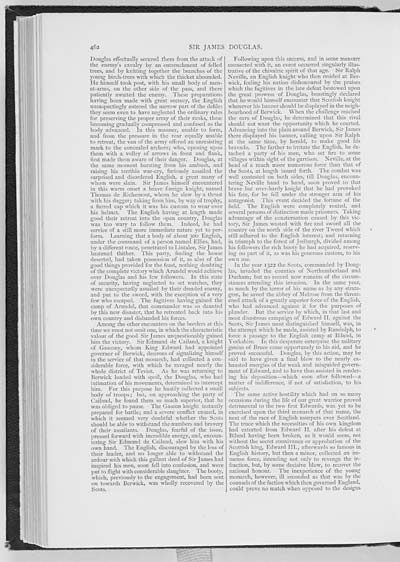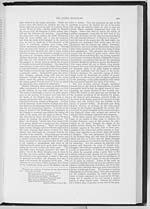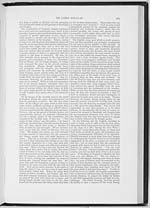462
Douglas effectually secured them from the attack of
the enemy's cavalry by an entrenchment of felled
trees, and by knitting together the branches of the
young birch-trees with which the thicket abounded.
He himself took post, with his small body of men-
at-arms, on the other side of the pass, and there
patiently awaited the enemy. These preparations
having been made with great secrecy, the English
unsuspectingly entered the narrow part of the defile:
they seem even to have neglected the ordinary rules
for preserving the proper array of their ranks, these
becoming gradually compressed and confused as the
body advanced. In this manner, unable to form,
and from the pressure in the rear equally unable
to retreat, the van of the army offered an unresisting
mark to the concealed archers; who, opening upon
them with a volley of arrows in front and flank,
first made them aware of their danger. Douglas, at
the same moment bursting from his ambush, and
raising his terrible war-cry, furiously assailed the
surprised and disordered English, a great many of
whom were slain. Sir James himself encountered
in this warm onset a brave foreign knight, named
Thomas de Richemont, whom he slew by a thrust
with his dagger; taking from him, by way of trophy,
a furred cap which it was his custom to wear over
his helmet. The English having at length made
good their retreat into the open country, Douglas
was too wary to follow them. Indeed, he had
service of a still more immediate nature yet to per-
form. Learning that a body of about 300 English,
under the command of a person named Ellies, had,
by a different route, penetrated to Lintalee, Sir James
hastened thither. This party, finding the house
deserted, had taken possession of it, as also of the
good things provided for the feast, nothing doubting
of the complete victory which Arundel would achieve
over Douglas and his few followers. In this state
of security, having neglected to set watches, they
were unexpectedly assailed by their dreaded enemy,
and put to the sword, with the exception of a very
few who escaped. The fugitives having gained the
camp of Arundel, that commander was so daunted
by this new disaster, that he retreated back into his
own country and disbanded his forces.
Among the other encounters on the borders at this
time we must not omit one, in which the characteristic
valour of the good Sir James unquestionably gained
him the victory. Sir Edmund de Cailand, a knight
of Gascony, whom King Edward had appointed
governor of Berwick, desirous of signalizing himself
in the service of that monarch, had collected a con-
siderable force, with which he ravaged nearly the
whole district of Teviot. As he was returning to
Berwick loaded with spoil, the Douglas, who had
intimation of his movements, determined to intercept
him. For this purpose he hastily collected a small
body of troops; but, on approaching the party of
Cailand, he found them so much superior, that he
was obliged to pause. The Gascon knight instantly
prepared for battle; and a severe conflict ensued, in
which it seemed very doubtful whether the Scots
should be able to withstand the numbers and bravery
of their assailants. Douglas, fearful of the issue,
pressed forward with incredible energy, and, encoun-
tering Sir Edmund de Cailand, slew him with his
own hand. The English, discouraged by the loss of
their leader, and no longer able to withstand the
ardour with which this gallant deed of Sir James had
inspired his men, soon fell into confusion, and were
put to flight with considerable slaughter. The booty,
which, previously to the engagement, had been sent
on towards Berwick, was wholly recovered by the
Scots.
Following upon this success, and in some measure
connected with it, an event occurred singularly illus-
trative of the chivalric spirit of that age. Sir Ralph
Neville, an English knight who then resided at Ber-
wick, feeling his nation dishonoured by the praises
which the fugitives in the late defeat bestowed upon
the great prowess of Douglas, boastingly declared
that he would himself encounter that Scottish knight
whenever his banner should be displayed in the neigh-
bourhood of Berwick. When the challenge reached
the ears of Douglas, he determined that this rival
should not want the opportunity which he courted.
Advancing into the plain around Berwick, Sir James
there displayed his banner, calling upon Sir Ralph
at the same time, by herald, to make good his
bravado. The farther to irritate the English, he de-
tached a party of his men, who set fire to some
villages within sight of the garrison. Neville, at the
head of a much more numerous force than that of
the Scots, at length issued forth. The combat was
well contested on both sides, till Douglas, encoun-
tering Neville hand to hand, soon proved to that
brave but over-hardy knight that he had provoked
his fate, for he fell under the stronger arm of his
antagonist. This event decided the fortune of the
field. The English were completely routed, and
several persons of distinction made prisoners. Taking
advantage of the consternation caused by this vic-
tory, Sir James wasted with fire and sword all the
country on the north side of the river Tweed which
still adhered to the English interest; and returning
in triumph to the forest of Jedburgh, divided among
his followers the rich booty he had acquired, reserv-
ing no part of it, as was his generous custom, to his
own use.
In the year 1322 the Scots, commanded by Doug-
las, invaded the counties of Northumberland and
Durham; but no record now remains of the circum-
stances attending this invasion. In the same year,
as much by the terror of his name as by any strata-
gem, he saved the abbey of Melrose from the threat-
ened attack of a greatly superior force of the English,
who had advanced against it for the purposes of
plunder. But the service by which, in that last and
most disastrous campaign of Edward II. against the
Scots, Sir James most distinguished himself, was, in
the attempt which he made, assisted by Randolph, to
force a passage to the English camp at Biland, in
Yorkshire. In this desperate enterprise the military
genius of Bruce came opportunely to his aid, and he
proved successful. Douglas, by this action, may be
said to have given a final blow to the nearly ex-
hausted energies of the weak and misguided govern-
ment of Edward, and to have thus assisted in render-
ing his deposition�which soon after followed�a
matter of indifference, if not of satisfaction, to his
subjects.
The same active hostility which had on so many
occasions during the life of our great warrior proved
detrimental to the two first Edwards, was yet to be
exercised upon the third monarch of that name, the
next of the race of English usurpers over Scotland.
The truce which the necessities of his own kingdom
had extorted from Edward II. after his defeat at
Biland having been broken, as it would seem, not
without the secret connivance or approbation of the
Scottish king, Edward III., afterwards so famous in
English history, but then a minor, collected an im-
mense force, intending not only to revenge the in-
fraction, but, by some decisive blow, to recover the
national honour. The inexperience of the young
monarch, however, ill seconded as that was by the
counsels of the faction which then governed England,
could prove no match when opposed to the designs

![]() Universal Viewer |
Universal Viewer | ![]() Mirador |
Large image | Transcription
Mirador |
Large image | Transcription
![]()

